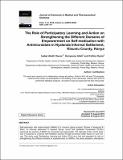The Role of Participatory Learning and Action on Strengthening the Different Domains of Empowerment on Self-medication with Antimicrobials in Nyalenda Informal Settlement, Kisumu County, Kenya
Publication Date
2019-08-30Author
Isabel Akoth Owuor, Harrysone Atieli, Collins Ouma
Metadata
Show full item recordAbstract/
Self-medication with antimicrobials (SMWA) is a common global practice. Studies in Nyalenda B
Ward, an informal settlement in western Kenya, found that significant households (76.6%)
perceived the practice of SMWA as convenient and appropriate. The rationale of the current study
was in response to unsolved self-mediation practice through functional health literacy in such setups. This study used Participatory Learning and Action (PLA) as a tool and assessed its role on
strengthening the different domains of empowerment on SMWA. The study adopted a descriptive
Original Research Article
Owuor et al.; JAMPS, 21(3): 1-12, 2019; Article no.JAMPS.50537
2
survey design and data was collected from 1531 PLA trainees through focused group discussions
and structured questionnaires. Results revealed that reasons for SMWA are ignorance and easier
accessibility. Logistic regression analyses with a statistical significance tested at p≤0.05
established the association between PLA domains and all empowerment domains revealed that
flexible learning and listening increase power within by 5 times (OR=5.361, 95% CI=3.101-9.268,
P<0.0001), power with by 6 times (OR=6.160, 95% CI=3.437-11.39, P<0.00010) and power over
by 2 times (OR=2.261, 95% CI=1.293-3.954, P<0.0001). Participatory evaluation may increase
power within by almost 8 times (OR=7.711, 95% CI=5.184-11.459, P<0.0001), power with by 5
times (OR=5.012, 95% CI=3.375-7.443, P<0.0001), and power over by more than 3 times
(OR=3.618, 95% CI=2,375-5,509, P<0.0001). Participatory interaction may increase power within
by almost 8 times (OR=7.823, 95% CI=4.798-12.763, P<0.0001), power with by over 8 times
(OR=8.610, 95% CI=4.987-14.866, P<0.0001.), power over by 4 times (OR=4.003, 95%CI=2.325-
6.693, P<0.0001). PLA proved to be a useful tool for strengthening all domains of empowerment
and integrated functions that prompted broader social connections.

